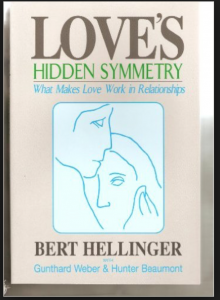Love’s Hidden Symmetry: Hellinger’s Work (part 1)
Of late I am reading Bert Hellinger’s book LOVE’S HIDDEN SYMMETRY: What makes love work in relationships (Zeig, Tucker & Co, Phoenix, Arizona: 1998). This book is amazing. I read it with a sense of wonder and delight, a feeling that at last there’s psychological work that deals honestly and practically with the deepest issues of the heart.
I’ve undergone a lot of psychotherapy, most of which I now view with suspicion. It isn’t that I didn’t get a lot out of the work. It isn’t that I don’t see how useful a compassionate witness can be. I grew from my nearly 18 years in therapy, and I have many times taken solace from, and given it as, a caring and non-judgmental presence.
However, there are some serious flaws with the way most contemporary therapy is practiced. To begin with, every shrink I know as a person, not professionally, is completely daft. Why do people become therapists? They want to fix themselves. Let me say, every shrink I know in a secular way needs all the help they can get. I look at these people while we’re socializing and think, Wow. People pay you to muck around in their psyche?
I don’t exempt myself. I was a healer for many years because I wanted to heal my self. That wasn’t the only reason, of course. Just as it isn’t the only reason people become therapists, psychiatrists, etc. They also have compassion. They mean well.
And they want to earn a living. They have a stake in their clients/patients staying crazy, not healing, in order to continue to earn a living. I am a big fan of people making a living, but I wonder about the conflict of interest here. Which leads me to one of the other distortions in modern psychotherapy, which is: it takes too damn long. That benefits the therapist but not the client.
The last few years I was in therapy, my therapist did a lot of the energy therapies with me: EFT, TAT, EMDR. I hear good things about neuro-linguistic programming, too. These techniques work well. They’re quick and elegant, and they cut through the bs like the sword cutting the gordian knot. More and more, it seems to me that all that talk therapy, regurgitating the same stuff about your mom and dad, serves mostly to re-wound people. Say it once, twice if it was a life-changing trauma, then move on–otherwise there’s a very good chance of falling into what Caroline Myss calls ‘woundology.’
Then too there seem to be plenty of people using talk therapy as an expensive and elaborate narcissistic crutch. They go to session as a means for rationalizing the most absolutely atrocious behavior. I’ve seen that a lot: “I have to talk to my therapist,” says someone, before behaving in a way that is criminally unkind.
Kindness matters a lot. Niceness not at all.
So, with these criticisms about psychotherapy, I turn to Hellinger’s family constellation work. I don’t agree with everything he writes. I’m probably never going to agree 100% with anything, including myself, because I use the tools of critical analysis at my disposal. That is, I discriminate: I separate the wheat from the chaff. The highest octave of this ability is discernment, something that modern psychotherapy, in its overly convoluted quest for a blithe blankness masking itself as neutrality, seems to be trying to eradicate from the contemporary mind. I also form opinions. Some are wrong, some are right, and most are strongly held. This is where I’ll quote Dante: “The hottest place in hell is reserved for those who, in times of great moral crisis, maintain their neutrality.” And we live in a time of great moral crisis.
In my opinion, Hellinger’s work is some of the most real and authentic work I’ve ever come across. This is a long post, so I’ll continue with why I like Hellinger in another post.


